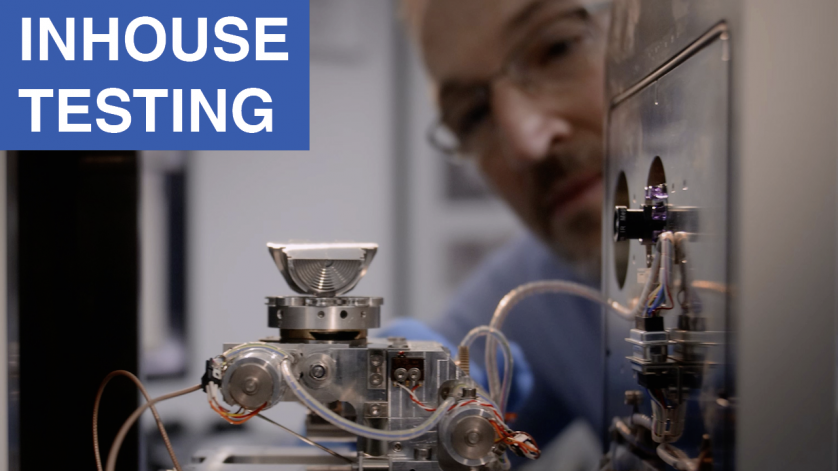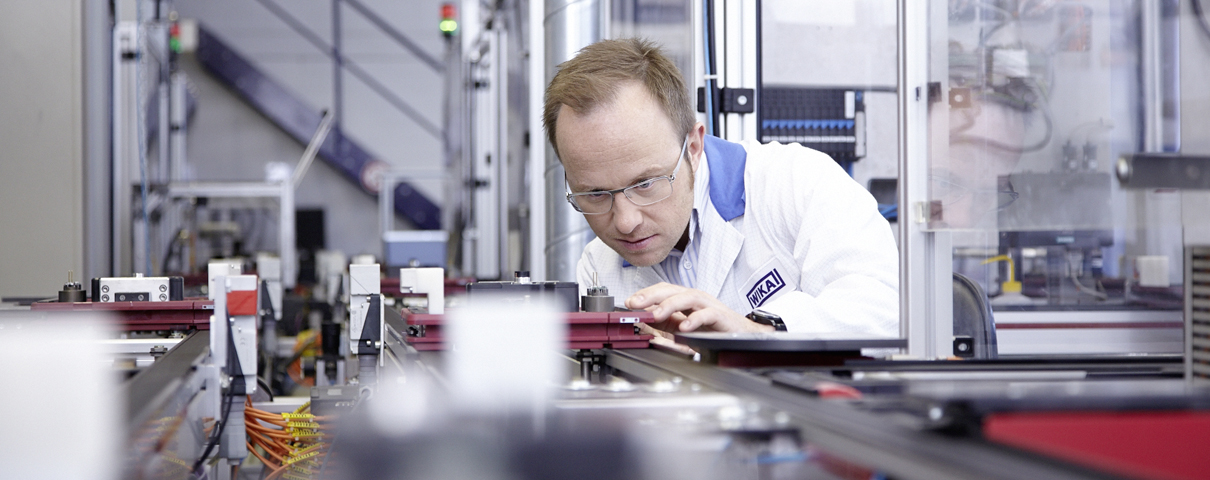
To support customers in their applications and to provide quality assurance, measuring instruments from WIKA undergo comprehensive in-house testing throughout their development cycle and beyond. This commitment to rigorous, impartial testing enables us to fulfil our performance, durability and reliability claims.
The data sheet for every WIKA measuring instrument contains a list of specifications attesting to its accuracy, performance and durability. These quality demands are ensured by a multitude of tests and inspections, most of which are carried out internally.
Measuring instruments: Comprehensive quality testing
Product testing is an important element of quality assurance, which is why we operate our own laboratories for this purpose. These in-house facilities meet global safety and performance standards and are also committed to impartiality. The test conditions in these laboratories are generally even stricter than those defined in the relevant standards. Moreover, testing at WIKA is not a one-off process, but takes place from conception to shipping – and beyond:
- Prototyping
Our engineers benefit from having a test laboratory on-site. During the R&D phase, they are able to create a prototype, get immediate feedback on its performance, and then fine-tune the parameters. This reconfigure-and-retest process continues until the new model meets our high standards and expectations. - Material quality
We test more than just products. Raw materials and components are also inspected in our laboratories on receipt and tested for quality before they reach the factory floor. - Release / Validation
We devote the most time and attention to this stage. Large quantities of each sensor are tested intensively in the widest range of configurations in sequential and parallel tests with regard to electronics, mechanics and environment. Once the validation – of both the product and the production lines – has been completed, the sensor will be released for serial production. - Production
During manufacturing, our test laboratories take random samples to check the construction, mechanics, connections and sensor element of the instrument. - Audits and service
Our test laboratories also conduct annual audits on our sensors to further substantiate the quality of our instruments. In the rare case of defects, we use, for example, scanning electron microscopes, digital microscopes and other advanced equipment to analyse the product and determine the cause of the problem.
MH-4: Thoroughly tested pressure sensor
A comprehensive battery of tests proves that the MH-4 OEM pressure sensor for mobile working machines has the reliability and performance that we claim in the product specifications:
- Load change tests: Pulsation and pressure spikes, load cycle, overload, etc.
- Vibration and shock tests: Random and continuous vibrations, single and continuous shocks, free falls, etc.
- Temperature tests: Dry heat, constant humidity, fast temperature cycling, rapid temperature changes, condensation, low/high temperature ranges, etc.
- Ingress protection tests: Dust, water immersion, high-pressure water jets, etc.
- Environmental and mechanical resistance tests: Electrical connector pull-off test, torque housing against process connection / electrical connection, case strength, impact test, solar radiation, salt spray test, icing, chemical resistance, corrosive gas testing, humidity, low-temperature storage, etc.
- Electrical tests: Voltage drops and changes, load dump, overvoltage protection, short-circuit resistance, reverse polarity protection, switch-on time, signal noise, diagnostic functions, long-term drift and stability, etc.
- EMC tests: Emitted interference, high-frequency immunity, immunity to electrostatic discharge, immunity to magnetic fields, etc.
MH-4: Ideally suited for mobile working machines
The MH-4 is a pressure sensor ideally suited for extreme environments. Alongside its proven quality and heavy-duty construction, it also offers OEM manufacturers a multitude of user-friendly advantages:
- Numerous configurations and interfaces for easy integration into production lines and machine platforms
- Compact design (about 2 inches/50 mm) for a better fit in today’s mobile working machines
- Two-wrench system suitable for socket wrenches to allow for integration into series production environments
- On-board diagnostics for easy fault detection on-site
The MH-4 is manufactured on a fully automated line that is continuously monitored for quality. The pressure sensors are thoroughly tested to specifications before being packed and shipped to customers worldwide. With all these features and quality assurances, the MH-4 is a proven pressure sensor for the measurement of operating and control pressure within mobile working machines such as construction, agricultural and forestry machinery, hoists, municipal vehicles or in material handling machinery.
WIKA: Trusted partner for OEM customers
The industrial instrumentation specialists at WIKA work closely with customers to ensure that our measuring instruments meet their application’s specific requirements. This extends to additional laboratory and field tests, especially for custom or modified products.
Note
Further information on model MH-4 or mobile working machines can also be found on the WIKA website. Contact us to learn more about our rigorous standards for quality. If you have any questions, your contact will gladly help you.
Also read our posts
Development of an OEM pressure sensor for mobile working machines
Extreme conditions: MH-4 pressure sensor for mobile working machines
Testing is an essential part of our company’s DNA. Get further insight into WIKA’s commitment to the highest quality standards through in-house testing in the following video:

